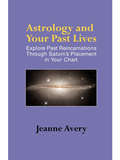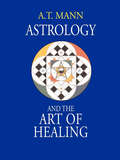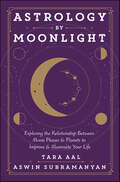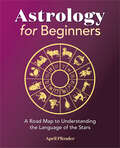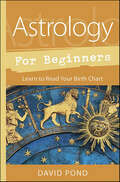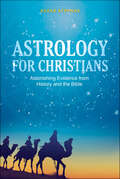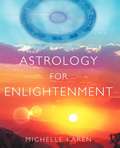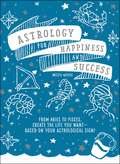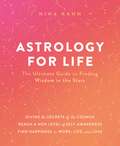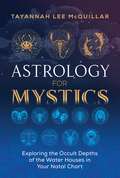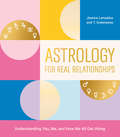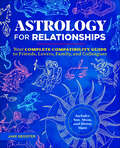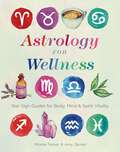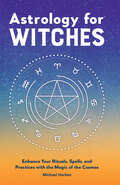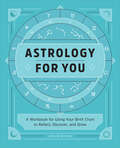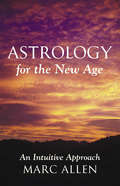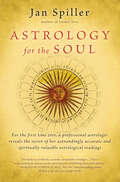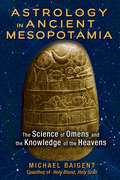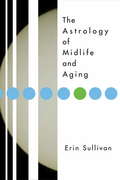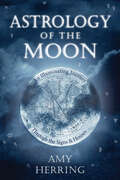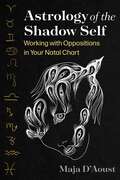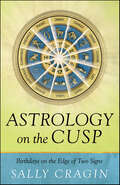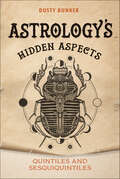- Table View
- List View
Astrology and Your Past Lives: Explore Past Reincarnations through Saturn's Placement in Your Chart
by Jeanne AveryUnderstanding your previous incarnations can turn into a fascinating journey of self-discovery and healing. You can gain insight into destructive habits that may have begun in a past life -- and then create a more positive and creative new life. In "Astrology and Your Past Lives" astrologer and regression therapist Jeanne Avery provides a simple yet profound way to understand one's blocks and blessings. By focusing on the meaning of one planet -- Saturn, the planet of limitations -- Avery shows how we "pick our own type of gravity" that connects this life to our previous incarnations.
Astrology and the Art of Healing
by A. T. MannConventional medicine treats symptoms with surgery and drugs rather than healing the root causes of illness. Complementary therapies attempt to address the whole self, which can raise awareness of and even counteract the imbalances that create disease. This book attempts to relate inner causes with our "four bodies" in order to affect healing. "Astrology and the Art of Healing" approaches healing and astrology in a new and revolutionary way. Physical, emotional, mental, and spiritual therapies relate to stages of your life process, from conception through birth, and from childhood to old age and death. Many horoscopes show how to understand the origins of health imbalances in your life. Correlations to appropriate therapies can support the expertise of your doctors. A free astro-chart is included.
Astrology by Moonlight: Exploring the Relationship Between Moon Phases & Planets to Improve & Illuminate Your Life
by Tara Aal Aswin SubramanyanUncover New Depths of Yourself by Decoding Moon- Planet Cycles and PhasesUniting Eastern and Western astrological approaches, this groundbreaking book takes you beyond static birth chart analysis and immerses you in the diverse power of the lunar phases. Tara Aal and Aswin Subramanyan reveal how the phasal relationships between the Moon and planets help you recognize your personal rhythms and find more meaning and purpose in everything you do.Astrology by Moonlight presents each Moon-planet interaction—and each phase during that interaction—as an opportunity to deepen your understanding of yourself. Start a new relationship or reignite a current one when Moon-Venus is in the new phase. Discover how Moon-Pluto in the balsamic phase helps you resolve issues of the past and move forward. Whether you're a beginner or seasoned practitioner, Astrology by Moonlight offers illuminating insights for every step of your cosmic journey.
Astrology for Beginners: A Road Map to Understanding the Language of the Stars
by April PfenderSee what the stars are saying about you!Do you know your sun sign? Moon sign? Rising sign? Astrology can open new doors to self-discovery and spark life-changing growth—and this zodiac book makes it easy to learn what your signs mean for you. Astrology for Beginners is packed with practical guidance to help you use the power of the stars to enhance every aspect of your life, from your daily routine to your hopes and dreams.A guide to getting started—Explore the different aspects of astrology, a bit of its history, and the many ways you can use it to discover more about yourself.The magic of astrology—Find straightforward explanations of the 12 signs of the zodiac, the 4 elements, the 3 modalities, the planets and houses, and how they interact with each other.Astrology for yourself—Learn how to interpret your birth chart and incorporate your key personality traits into your self-care routine, relationships, and career.Unlock the wisdom of the cosmos with this top choice in astrology books for beginners.
Astrology for Beginners: Learn to Read Your Birth Chart (Llewellyn's For Beginners)
by David PondSimple Astrological Guidance for Self-Development and Conscious LivingConcise and direct, this easy-to-use guide provides everything needed to uncover the secrets of your birth chart and reveal amazing insights about your true nature. You'll gain an incredibly expanded understanding of yourself—and others—with this book's extensive information and examples.Professional astrologer David Pond introduces you to the most important topics of astrology, including the zodiac signs, planets, houses, aspects, and more. He then builds on the basics to teach you how to interpret your astrological chart and those of the people in your life. From planetary patterns and Sun signs to retrogrades and cusps, this book brings the stars down to earth so you can study astrology with ease.
Astrology for Christians: Astonishing Evidence from History and the Bible
by Suzan StephanTracing the roots of astrology from Abraham through the life of Christ and the surrounding Roman Empire, this book provides astonishing evidence that astrology once held an essential position within early Christian beliefs and traditional monotheistic Hebrew culture. Powerful proofs from history and the Bible are examined, and the reasons behind the unfounded defamation of astrology by Roman church authorities are presented, finally legitimatizing astrology for Christians today. Applicable to the seasoned astrologer, yet easy to understand by those with little knowledge of astrology, detailed historical and astrological evidence behind the Star of Bethlehem, the biblical nature of wisdom, and the wise men are explored. Original horoscopes for King David and the eclipse preceding the birth of Jesus are described, with astounding implications for modern understanding. The final messages are clear: God is real. The story of Jesus Christ is real. The manifestation of God’s will is real, and nowhere in the Bible is there a condemnation of astrology.
Astrology for Enlightenment
by Michelle KarenIn Astrology for Enlightenment, "Astrologer to the Stars" Michelle Karén gives you the tools to predict and guide your future and, by distilling astrology down to its purest form, shows you how to achieve enlightenment. Drawing on over thirty years of study and experience, Karén has created an accessible, easy-to-follow, hands-on guide for using astrology that can enhance every aspect of your daily life and help you: - Learn when to schedule an important business appointment so that you'll get the best results. - Understand where your relationship will lead when you meet someone for the first time. - Find out which is the best day of the week to start a new project. - Uncover a phone caller's true intentions. - Gain precious understanding and insight into the ancient prophecy of John of Jerusalem, which Karén translates to provide breathtakingly accurate predictions for our times. - Obtain specific information for each sign in each year through 2012. It is your birthright to live a life filled with tremendous peace, unconditional joy, and true love. Astrology for Enlightenment offers you the tools to do all of this and to reach a state of ultimate bliss. Are you ready? Karén's Astrology for Enlightenment is all you need to prepare yourself for the exciting shifts to come.
Astrology for Enlightenment
by Michelle KarenIn Astrology for Enlightenment, "Astrologer to the Stars" Michelle Karén gives you the tools to predict and guide your future and, by distilling astrology down to its purest form, shows you how to achieve enlightenment. Drawing on over thirty years of study and experience, Karén has created an accessible, easy-to-follow, hands-on guide for using astrology that can enhance every aspect of your daily life and help you: - Learn when to schedule an important business appointment so that you'll get the best results. - Understand where your relationship will lead when you meet someone for the first time. - Find out which is the best day of the week to start a new project. - Uncover a phone caller's true intentions. - Gain precious understanding and insight into the ancient prophecy of John of Jerusalem, which Karén translates to provide breathtakingly accurate predictions for our times. - Obtain specific information for each sign in each year through 2012. It is your birthright to live a life filled with tremendous peace, unconditional joy, and true love. Astrology for Enlightenment offers you the tools to do all of this and to reach a state of ultimate bliss. Are you ready? Karén's Astrology for Enlightenment is all you need to prepare yourself for the exciting shifts to come.
Astrology for Happiness and Success: From Aries to Pisces, Create the Life You Want--Based on Your Astrological Sign!
by Mecca WoodsLet your astrological sign show you the way to your best life—find specific activities that will improve relationships, finances, health, and happiness based on your Zodiac sign! Take your happiness to the next level with advice specifically designed for you, based on your astrological sign. In Astrology for Happiness and Success, you&’ll find new ways to be happier and more successful and learn to bring joy to those around you. Take an adventurous Aries to your next yoga class to help you both clear your minds, treat your busy Taurus friend to a relaxing evening at home, join Gemini in playing a new board game for fun—and more! With different activities, therapeutic techniques, and relaxation rituals for each sign, you&’ll find the perfect path to becoming your happiest and healthiest self.
Astrology for Life: The Ultimate Guide to Finding Wisdom in the Stars
by Nina KahnMake your day-to-day life more magical, spiritual, and in sync with the stars!Graduate from daily horoscopes and dive into a deeper understanding of astrology with this user-friendly tell-all guide to the cosmos. Nina Kahn's Astrology for Life spills the tea on our celestial neighbors: the Sun, Moon, and planets (plus all twelve zodiac signs) so you can get to know their quirky personalities and use their energies to your advantage every day. Learn your way around a birth chart and get the lowdown on nodes, aspects, degrees, decans, Moon signs, rising signs, retrogrades, eclipses, and more! Most importantly, discover how to use planetary transits to step up your career game, find love, take better care of yourself, crush your goals, and live your most magical life. -Go beyond your Sun sign to uncover a deeper, more nuanced astrological profile— one that’s truly unique to you. -Learn to read the basics of your birth chart in a way that inspires self-reflection and understanding. -Start using retrogrades, eclipses, and the cycles of the Sun and Moon to your advantage. -Align yourself with the cosmos to welcome new opportunities for love, career success, and personal achievements. -Build a stronger connection to the universe and find your place among the stars.With Astrology for Life, you can satisfy your cosmic curiosity and make your journey through life even more wondrous and fulfilling!
Astrology for Mystics: Exploring the Occult Depths of the Water Houses in Your Natal Chart
by Tayannah Lee McQuillarA guide to discovering and developing the spiritual and mystical talents hidden in your astrological chart • Explores the 4th, 8th, and 12th houses of the natal astrological chart—those connected with the water signs, the deepest and darkest areas of the individual psyche, profound spiritual insights, and hidden knowledge • Explains how to interpret the signs and planets in the water houses of your birth chart, including how to develop the innate talents and spiritual powers you discover • Reveals the occult and psychic significance of water and shows how this significance is expressed in each of the three water signs: Cancer, Scorpio, and Pisces, the rulers of the water houses Your astrological birth chart, or natal chart, shows the positions of the planets, sun, and moon at the time of your birth. Shaped like a circle or wheel, it is divided into 12 sections, or &“houses,&” each connected with a different area of life or self. The positions of the planets within the houses offer deep and often complex insight into your unique gifts and your life&’s path. In Astrology for Mystics, Tayannah Lee McQuillar explores the 4th, 8th, and 12th houses--those connected with the element of water and all things occult, mystical, and spiritual. The fourth house, ruled by water sign Cancer, is traditionally the house of family, home, ancestors, and suffering. The eighth house, ruled by water sign Scorpio, is the house of sex, death, secret powers, and transformation. The twelfth house, ruled by Pisces, is the house of karma, loss, unspoken expectations, fantasy, and confinement. As McQuillar explains, these are the houses that reveal the deepest and darkest areas of the individual psyche, which many people are reluctant to explore, yet this triad is the key to profound spiritual insights as well as the discovery of hidden knowledge and abilities. The author guides you through interpreting the signs and planets that inhabit the water houses in your natal chart and shows how they reveal specific innate talents. She describes how to develop the hidden powers revealed by your chart and offers practical advice for incorporating this knowledge into your daily life for spiritual growth and self-improvement. Sharing interpretation examples from her practice, she also explores how to embrace the challenge of the occult water houses so you can claim the many treasures that can only be found on the ocean floor of the psyche.
Astrology for Real Relationships: Understanding You, Me, and How We All Get Along
by Jessica Lanyadoo T. GreenawayA modern, inclusive guide to astrology that will illuminate your love life as well as your relationships with your family, your friends, and yourself.When it comes to friendship, family, and romance, we all want the same things: to love and be loved, to communicate, to fight fair, and to feel okay in our own skin. Astrology for Real Relationships is a modern, practical guide to life's least practical matters--relationships of all kinds and matters of the heart--that will help you understand your blind spots, blocks, and fears so you can make choices that leave you happy and fulfilled. Full of real talk about attraction, dating, sex, frenemies, self-love, and how to deal with family, this book will help you build and maintain strong connections--with your crushes, your spouse, your boss, or your mom--and uncover and get what you really want in relationships, not what you think you should want.
Astrology for Relationships: Your Complete Compatibility Guide to Friends, Lovers, Family, and Colleagues
by Jake RegisterYour answers to love, dating, and relationship questions are in the starsLooking for ways to grow closer to people in your life and understand them on a deeper level? Astrology for Relationships can show you how other people operate, what motivates them, and how to best connect. It is an inclusive, progressive approach to bonding that addresses compatibility across a spectrum of potential pairings.Look beyond the traditional sun-sign focused, traditionally perceived pairings to also explore relationship compatibility among moon and ascendant/rising signs. Well-organized and comprehensive, Astrology for Relationships explores compatibility across a range of association types, including romantic partnerships, friends and family, and colleagues. It is written in a way that anyone, regardless of gender and sexual orientation, can read and feel included.Inside Astrology for Relationships you'll find:Beginner to advanced—Whether you are new to astrology or well versed, it's a perfect resource for people at all stages of their quest for astrological insight.More than just sun signs—Explore more complex astrological compatibilities, including those based on moon signs and ascendant/rising signs.All-inclusive—This guide was written to include all gender identities and sexual orientations, so no one is left out.Build your understanding of relationship-based astrology with the most comprehensive and inclusive resource under the stars.
Astrology for Wellness: Star Sign Guides for Body, Mind & Spirit Vitality
by Amy Zerner Monte FarberAstrology can help us divine the future—but it&’s also a perfect path to reclaiming your personal power through wellness practices tailored to your sign. Type-A Aries is prone to burnout at work and should de-stress with hot baths. If you were born in Cancer, you should be wary of bottling up anxieties and consider artistic ways to express them instead. Capricorns benefit from routine, but watch out if you&’re a spontaneous Sagittarius! Seasoned astrologers Monte Farber and Amy Zerner provide a detailed analysis of each sun sign and a treasury of wellness remedies for each, including teas and tonics, crystals for healing, mindful meditations, breathing affirmations, fitness styles, and more. Astrology for Wellness provides all the information you&’ll need to understand your personality profile, enhancing personal strengths for mental clarity, physical strength, and spiritual insight.
Astrology for Witches: Enhance Your Rituals, Spells, and Practices with the Magic of the Cosmos
by Michael HerkesEnhance your magical practice with the power of the stars Combining the magic of the cosmos with the power of witchcraft can help you realize your true potential and manifest your deepest desires. Full of practical guidance and tools for expanding your practice, this book is a road map for incorporating the cosmic forces of the universe into your life through witchcraft. What sets this book apart from other astrology books: An intro to astrology and witchcraft—Review the fundamentals of astrology and discover how it can help you become a stronger witch. Spellcasting guidance—Find advice for stocking your magical cupboard and explore the various ways you can craft spells by using aspects of the natural world, like the phases of the moon and planetary timing. Simple spells and rituals—Put what you learn into practice with a collection of astrological spells and practices for confidence, relationships, success, and much more. Unlock the door to more powerful magic with Astrology for Witches.
Astrology for You: A Workbook for Using Your Birth Chart to Reflect, Discover, and Grow
by Jessie EcclesExplore your birth chart, answer insightful prompts, and see what the stars say about you! Astrology is a powerful tool that can open you up to greater self-understanding and personal growth. This astrology workbook shows you how to obtain your birth chart and interpret what it says, so you can discover your most deeply-held truths, create focused intentions, and manifest the life you desire. A clear introduction — See your true potential as you learn about the planets, signs, and houses and how they inform your personality, beliefs, relationships, and more. An interactive workbook format —Find space to fill in your birth chart, and use it to complete guided exercises and insightful prompts that offer clarity on what each placement in your chart means for you. Apply astrology to your life —Learn how to use the knowledge from your birth chart to make choices about everything from your career, to where you live, and what you're passionate about. Find answers and achieve your goals with this astrology book .
Astrology for the New Age
by Marcus AllenThrough a simple and effective approach, you are shown how to unlock the vast resources of the intuitive mind. You will learn how to create your own positive readings and interpretations for practical daily use. Everything you need to be your own intuitive astrologer! Whether beginner or advanced practitioner, this book will open new and exciting territories.
Astrology for the Soul
by Jan SpillerFor the first time ever, a famous spiritual astrologer shares the secrets, previously known only to professionals, that hold the key to your future. Astrologer Jan Spiller shows you the key to discovering your hidden talents, your deepest desires, and the ways you can avoid negative influences that may distract you from achieving your true life purpose, as revealed in your chart by the position of the North Node of the Moon. With insight and depth impossible to gain from the commonly known sun-sign profiles, the enlightening self-portrait offered by the Nodes of the Moon can explain the life lessons you came here to learn and how to achieve the fulfillment and peace you desire. Jan Spiller shows you how to locate the all-important North Node of the Moon in your astrological chart and provides a detailed interpretation of its influence and exclusive exercises to help you learn about: • The SPECIAL TALENT that is waiting for you, a unique gift that could easily be turned into professional success • The SELF-DEFEATING TENDENCIES in your personality that can hold you back and sabotage relationships • The LOVE PARTNER who can be your soul mate—and the partner whose hold over you can lead to heartbreak • The TRAP or temptation from a past life that can lead to disaster if you are not forewarned • The HEALING AFFIRMATIONS designed to help you release your positive energy and strengthen the qualities that can bring you true happiness Jan Spiller is nationally recognized as a leader in the astrology field. She is a faculty member of the American Federation of Astrologers and co-author ofSpiritual Astrology.
Astrology for the Soul
by Jan SpillerFor the first time ever, a famous spiritual astrologer shares the secrets, previously known only to professionals, that hold the key to your future.Astrologer Jan Spiller shows you the key to discovering your hidden talents, your deepest desires, and the ways you can avoid negative influences that may distract you from achieving your true life purpose, as revealed in your chart by the position of the North Node of the Moon. With insight and depth impossible to gain from the commonly known sun-sign profiles, the enlightening self-portrait offered by the Nodes of the Moon can explain the life lessons you came here to learn and how to achieve the fulfillment and peace you desire. Jan Spiller shows you how to locate the all-important North Node of the Moon in your astrological chart and provides a detailed interpretation of its influence and exclusive exercises to help you learn about:* The SPECIAL TALENT that is waiting for you, a unique gift that could easily be turned into professional success* The SELF-DEFEATING TENDENCIES in your personality that can hold you back and sabotage relationships* The LOVE PARTNER who can be your soul mate--and the partner whose hold over you can lead to heartbreak* The TRAP or temptation from a past life that can lead to disaster if you are not forewarned* The HEALING AFFIRMATIONS designed to help you release your positive energy and strengthen the qualities that can bring you true happinessJan Spiller is nationally recognized as a leader in the astrology field. She is a faculty member of the American Federation of Astrologers and co-author of Spiritual Astrology.From the Trade Paperback edition.
Astrology in Ancient Mesopotamia: The Science of Omens and the Knowledge of the Heavens
by Michael BaigentA detailed study of the earliest forms of astrology in Mesopotamia and their far-reaching hermetic influences from the Renaissance to the present day• Reveals the roots of modern astrology in the Babylonian science of omens, which was concerned not with individuals but with the state and king• Explores Mesopotamian mythology as it relates to the planets and to astrology• Traces the hermetic transmission of this knowledge over the centuries from Mesopotamia to Egypt to Renaissance ItalyAmong the many significant discoveries excavated from Assyrian king Ashurbanipal’s royal library in Nineveh were tablets documenting the development of Mesopotamian astrology, now recognized as the earliest astrological science.Drawing upon translations of the Nineveh library tablets as well as many other ancient sources, Michael Baigent reveals the roots of modern astrology in the Babylonian science of omens. He explains how astrology in the Babylonian and Assyrian empires was concerned not with individuals but with the king and the state. He shows that by the first dynasty of Babylon, around 1900 to 1600 BC, astrology had become a systematic discipline, the preserve of highly trained specialists intent upon interpreting omens from the movements of planets and stars. He explores Mesopotamian mythology as it relates to the planets and to astrology as well as to Mesopotamian religion, magic, and politics--for the mythology of Babylon and Assyria served the state and thus changed as the state changed. He shows how this ancient form of astrology uniquely represents both Sun and Moon as masculine entities and Saturn (Ninurta) as the principle of order imposed on chaos. He examines the connections between ancient astrology and the symbolism of Western religions, such as how the “Greek” or “Templar” cross may symbolize the Babylonian god Nabu, now known as Mercury.Tracing the hermetic transmission of this knowledge over the centuries from Mesopotamia to Egypt to Florence, Baigent reveals how the religious and magical aspects of early Babylonian cosmological speculation played a significant role in the Renaissance, influencing prominent figures such as Cosimo de Medici, Marsilio Ficino, and Botticelli.
Astrology of Midlife and Aging
by Erin SullivanThe first in-depth analysis of how an individual's natal horoscope reveals the unique challenges and opportunities of midlife. Between the ages of thirty-seven and forty-one, something mysterious takes place within the psyche. Jung called this phase our "unlived life," assuming rightly that midlife did not inaugurate a time of rapid decay, loss of libido, and inevitable death—but rather ushered in a period in which one might review one's life and build upon a strong foundation toward the next phase of adulthood. Acclaimed astrologer Erin Sullivan takes us through the vast changes that astrology reveals as we reach middle age. It is a moment in life that is characterized by the planet Uranus, one filled with opportunities to both rethink the past and move forward toward the future, "witnessing" our lives in the way Uranus connotes. There exist no maps of the terrain—except the natal horoscope. .
Astrology of the Moon: An Illuminating Journey Through the Signs & Houses
by Amy HerringYour moon sign represents your emotional nature and lights the way toward profound spiritual growth. With Astrology of the Moon, you can identify and better understand your core emotional needs, learn to fulfill them, and make positive choices for a more rewarding, spiritually enriched life.Illuminating the natal and progressed moon relationship, this information-packed astrology book explains the moon's powerful energetic potential in relation to the signs, houses, planets, and aspects. In an easy-to-use "cookbook" format designed to help you quickly look up your moon sign, Amy Herring reveals your ever-evolving emotional needs when it comes to love, family life, spiritual health, career planning, and more.You will also find many practical activities and ideas to maximize your creative potential and fulfill your essential needs so you can create happiness at every stage of life.Praise:"A new book about new astrology for the New Age! Even a seasoned astrologer will find the insights new and sometimes profound. This is a good book to highlight in your astrology section." —New Age Retailer"For beginners and more advanced students alike, Amy Herring's Astrology of the Moon will illuminate the path to personal growth."—Dell Horoscope
Astrology of the Shadow Self: Working with Oppositions in Your Natal Chart
by Maja D'Aoust• Explains how to determine your shadow planets and zodiac signs through the oppositions of your birth chart • Details the meaning and challenges of each shadow counterpart for every astrological sign and planet that appears in a traditional astrological chart • Looks at the alchemical nature of the dark side of the human mind and shadow-work methods for bringing the oppositional self into personal awareness Recently rediscovered by modern psychology, the shadow self was recognized in ancient teachings as an inseparable part of the human being, a vital portion of who we are. The ancient Egyptians regarded working with the shadow as a necessary part of spiritual growth, and shadow work practices are alluded to in the oldest writings. In this practical guide to shadow astrology, Maja D&’Aoust explains how to determine the shadow polarities of your natal chart and explore the hidden wisdom and challenges of the oppositional identity within. She shows how finding your shadow planets is easy—they are the opposite sign of the planets in your birth chart. For example, someone with the sun in Libra will have their shadow sun in Aries. She explains how, just like the traditional planets of astrology, each shadow planet governs a specific area of human activity: Venus shadows speak of tainted love, while Mercury shadows reveal challenges of the mind. Each of these shadow planets presents a specific type of negative challenge that emerges when opposition arises. Providing vivid examples, the author details the meaning of each shadow counterpart for every astrological sign and planet that appears in a traditional astrological chart and explains how to interpret and work with their challenges. In addition to chart interpretation, the author also explores the history of this astrological method, including its roots in ancient Egypt, ancient Greece, and the Western magic tradition. She looks at the alchemical nature and subconscious influences of the dark side of the human mind and the shadow-work methods necessary for bringing the oppositional self into personal awareness. Revealing how to interpret astrological charts for personal growth and conscious evolution, this guide invites you to explore the darkness within in order to know the totality of your whole self.
Astrology on the Cusp: Birthdays on the Edge of Two Signs
by Sally CraginIs your birthday between two different signs? Discover new insights into yourself and others with this first-ever guide to cusp astrology.We've all heard the term "born on the cusp"—but what does it mean, exactly? What if you were born just as the sun moves into Aries, but you feel more like a Pisces? If your birthday falls on a date when a sign changes over to another, you probably possess traits of each. Engaging and easy to use, this book goes beyond simple, cut-and-dried archetypes of sun sign astrology, yet doesn't require any special knowledge. You'll get a deeper understanding of your personality and motivations—and those of your partner, friends, family members, and anyone else whose birthday is on the edge of two signs.Organized by date of birth, this astrology book lets you quickly look up your birthday so you can identify your particular strengths, gifts, and challenges. You'll also find out about your career and upcoming opportunities, times of the year when you can expect obstacles and rewards, and which signs are your best matches for love and romance. Helping to illuminate each cusp birthday's characteristics are examples of well-known figures such as Robert Redford and Meryl Streep.
Astrology's Hidden Aspects: Quintiles and Sesquiquintiles
by Dusty BunkerDiscover astrological quintiles and sesquiquintiles as detailed by renowned astrologer Dusty Bunker. Presented for the first time, full interpretations of the astrological quintiles and the sesquiquintiles using the ten traditional planets and the Ascendant. In this groundbreaking book, astrologer Dusty Bunker reveals the importance of the 72° quintile and the 108° sesquiquintile, two previously ignored astrological aspects, which the Egyptians called the “sacred golden bowls.” With information gathered over thirty years through studying esoteric numbers, sacred geometry, Masonic manuscripts, religious texts, Egyptian symbols, and much more, Dusty shows why these aspects should be considered among the most important in the lexicon of astrologers because they reveal your hidden talents and your legacy, your path to fame! With a dusty map in hand, travel from the cosmic birth of the quintiles and the sesquiquintiles to the sand-covered site where these golden-bowl aspects have remained hidden all these years. This important reference book should be part of every astrologer’s library.
